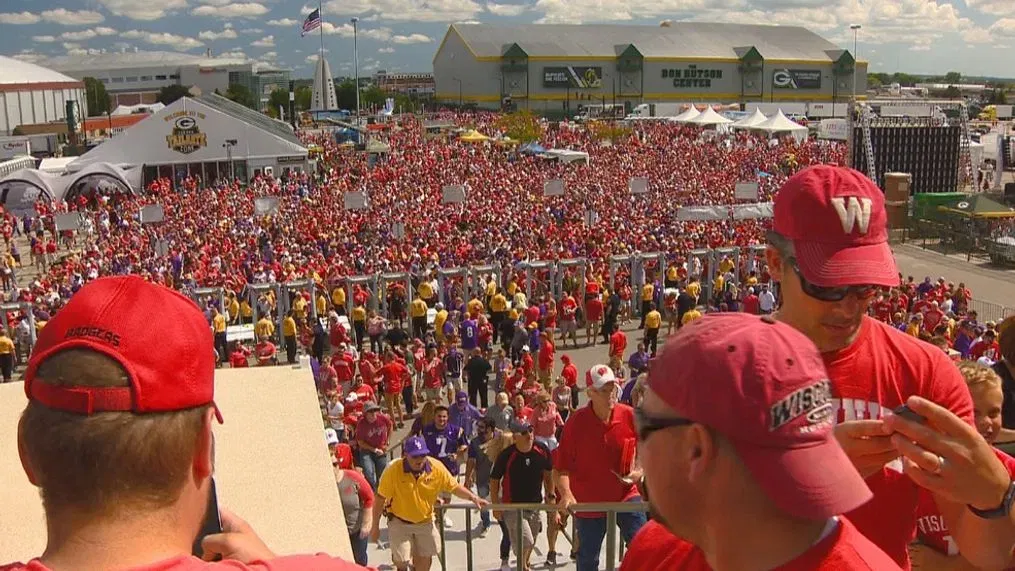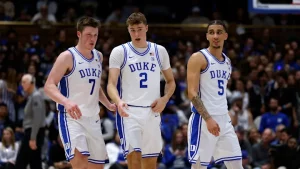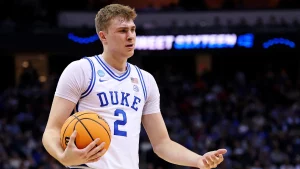
The much-anticipated clash between the Wisconsin Badgers and the Notre Dame Fighting Irish, originally scheduled for the 2026 college football season at historic Lambeau Field, has officially undergone a date change. Though both programs remain committed to the marquee non-conference matchup, the rescheduling has stirred discussion across the college football landscape. What was once a fall centerpiece will now shift to a different slot on the calendar—raising both logistical questions and broader implications for two of the sport’s most tradition-rich programs.
The meeting at Lambeau Field will mark the second leg of a home-and-home neutral-site series originally agreed upon years ago. The first game was held at Soldier Field in Chicago in 2021, where Notre Dame triumphed over Wisconsin 41–13 in a dominant second-half performance. The second game, initially slated for fall 2026, was always intended to be a return leg—this time deep in Badger country, under the iconic lights of Lambeau.
That first meeting offered no shortage of storylines. Then-Notre Dame quarterback Jack Coan, a Wisconsin transfer, led the Irish to victory against his former team, showcasing grit and poise. The two programs haven’t met often in recent history, with their last regular-season home-and-home series dating back to the early 1960s. Thus, the 2026 game remains a rare and highly coveted intersection of historic football legacies, amplified by its unique setting in Green Bay, Wisconsin.
While the official reason behind the date change remains somewhat shrouded in vague administrative language—”scheduling conflicts” being the most repeated phrase—insiders point to several contributing factors: evolving broadcast deals, expanded College Football Playoff implications, and the increasing complexity of non-conference scheduling due to the SEC and Big Ten expansion.
According to sources close to both programs, the game will now take place earlier than originally planned, shifting from late October to a late-September window. That seemingly modest change has outsized implications for fan logistics, national exposure, and strategic planning by the coaching staffs.
For Notre Dame, the date change creates a slightly more favorable pacing of their 2026 slate, allowing them to avoid a cluster of power-five opponents in October. For Wisconsin, the move offers the potential benefit of an early national spotlight, possibly setting the tone for the Badgers’ new era under head coach Luke Fickell.
Lambeau Field is more than just a location—it’s a sacred space in American sports. Known as the “frozen tundra” and home to the Green Bay Packers, Lambeau adds a unique layer of tradition to a college football matchup already steeped in history. This isn’t just a game—it’s an event.
By moving the game earlier in the season, there’s a strong chance it avoids the harsh, unpredictable Wisconsin weather that can grip Green Bay in late fall. While that may disappoint fans eager to see a cold-weather showdown reminiscent of NFL playoff lore, it’s a strategic move that could ensure better field conditions, fewer weather delays, and safer travel for tens of thousands of fans descending on the small city.
The earlier date also aligns better with television networks’ early-season scheduling windows, potentially positioning the game as a primetime kickoff in a less competitive weekend, giving it the standalone spotlight it deserves.
Both Wisconsin and Notre Dame are in pivotal phases of program evolution. Notre Dame, under head coach Marcus Freeman, has become a recruiting juggernaut with momentum in several key battles against SEC powerhouses. The Fighting Irish continue to operate as college football’s most visible independent, and this type of high-profile game is essential in bolstering their national brand.
Wisconsin, meanwhile, is in the midst of a modernizing effort. Luke Fickell’s arrival has brought with it a more aggressive approach to talent acquisition and an emphasis on high-powered offensive schemes—far from the ground-and-pound, defense-first identity the Badgers have leaned on for decades. Beating a program like Notre Dame, especially at Lambeau, would signal Wisconsin’s readiness to join the nation’s elite under the new Big Ten structure.
From a recruiting standpoint, the earlier date allows both programs to capitalize on momentum heading into the mid-season evaluation period. Recruits attending the game can build enthusiasm earlier in the fall, and the exposure from what is expected to be a widely viewed national broadcast may influence a new wave of interest in both programs.
While many fans have expressed excitement about the new date, the shift has also created challenges. Those who made early travel plans based on the previously announced weekend have had to adjust lodging and transportation. Hotel availability in Green Bay—already limited due to the town’s size—has become a point of concern, with prices fluctuating rapidly in response to the date change.
The Green Bay tourism office has issued a statement reassuring visitors that accommodations are being coordinated with event planners and local businesses to manage the influx. Notre Dame fans, known for traveling en masse to big games, are expected to converge in full force, just as they did for the Soldier Field matchup in 2021.
Tailgating traditions are also expected to be in full swing, with Lambeau Field’s unique fusion of NFL history and college football passion creating one of the most anticipated atmospheres of the 2026 season.
Make no mistake: the real driver behind this date change may well be television. With networks like NBC, Fox, and CBS locked in fierce competition for premier games in the post-expansion Big Ten and SEC eras, shifting a marquee game to a less crowded weekend is a strategic ratings play.
Early indications suggest that NBC—Notre Dame’s longtime media partner—is pushing hard to make the Lambeau showdown a Saturday night primetime broadcast. That could position it alongside other early-season classics like Alabama-Texas or Georgia-Oregon. The network exposure alone could elevate this game from intriguing neutral-site curiosity to season-defining event.
This also offers the networks another opportunity to create a spectacle around the game itself—think College GameDay, Friday night specials, and surrounding documentary-style programming. For both programs, the national spotlight is not just desirable; it’s essential.
On the field, moving the game to September alters how both coaching staffs will prepare their teams. Typically, elite programs schedule their toughest non-conference matchups early in the season to establish identity and test team resilience. This shift aligns with that philosophy.
For Marcus Freeman and Notre Dame, a strong early-season showing at Lambeau can set the tone for a potential College Football Playoff campaign, especially as their schedule already includes traditional rivals like USC and Stanford. A win over Wisconsin could solidify Notre Dame’s top-five ambitions and serve as a major resume booster.
For Wisconsin, it’s an opportunity to make a statement under Fickell. With a roster that is steadily becoming more athletic and versatile, an early test against a top-tier independent can offer clarity about where the Badgers stand in the rapidly changing Big Ten ecosystem.
This development is another sign of how college football’s calendar is becoming increasingly fluid. As conferences realign, networks jostle for exclusivity, and the Playoff expands, games like Wisconsin-Notre Dame are no longer just scheduled—they’re curated for maximum impact.
Neutral-site games used to be rare, then trendy, then oversaturated. But playing at Lambeau Field, one of the most iconic venues in American sports history, ensures this contest transcends the routine neutral-site fare. It’s a fusion of tradition and spectacle—a nod to the past and a glance toward the sport’s rapidly modernizing future.
While the change in date has created some inconvenience and confusion for fans, the underlying motive appears sound: greater exposure, better conditions, and stronger positioning for both teams on the national stage. This is not just a scheduling update—it’s a reflection of how college football is being re-engineered in real time.
The Wisconsin Badgers and Notre Dame Fighting Irish will still square off in one of the most historic venues in sports. The only thing that’s changed is the date—but the anticipation, the stakes, and the spectacle remain very much intact.
For fans, players, and coaches alike, the wait for this game just became a little more strategic—and a whole lot more intriguing.





